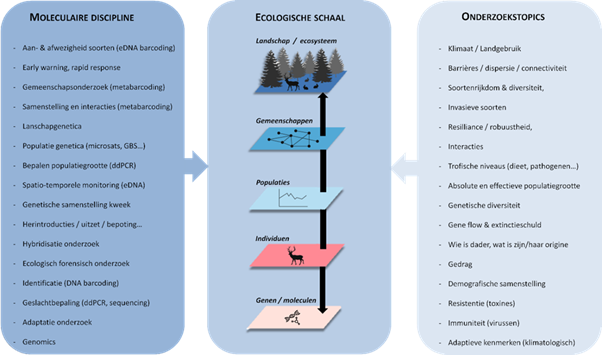Genetic diversity
In Flanders, INBO is leading in the development of innovative genetic expertise and infrastructure linked to a broad ecological knowledge of nature. INBO is fully committed to scale-up and efficiency gains of our monitoring programmes. This can be done through innovative genetic research. We want to support a wide range of species- and area-specific conservation programmes through research into the genetic status of our biodiversity.
Methods based on eDNA (environmental DNA) will be used more systematically. Based on small traces that organisms leave behind in an environment, we can map target species (eDNA barcoding) or entire communities (eDNA metabarcoding). For example, we can detect rare or invasive species efficiently and non-invasively. We can also monitor population densities e.g. for monitoring networks and for evaluating reintroduction programmes.
INBO aims to map the genetic diversity of populations and species. This allows us to understand the evolutionary processes that allow populations to adapt to an increasingly rapidly changing environment. Through genetic research, we can identify priority areas and measures to improve ecological connectivity to maintain and strengthen populations. In reintroductions and translocations, we evaluate population genetics to increase the likelihood of sustainable success.
Genetic research also plays an important role in selecting suitable provenances of tree species for forestry purposes. For this, we use long-term provenance trials and genetic characterisation of genebanks and seed orchards. This allows us to optimally use and preserve genetic variation.
INBO will explore the further development of a 'wildlife crime unit', where genetic methods play an important role in detecting illegal trade of species quickly and consistently.
Genetic research at INBO is thus highly stratified on different ecological levels. To support ecological policy in Flanders, we want to shift from short-term and often ad hoc research to a more systematic use of molecular techniques.

